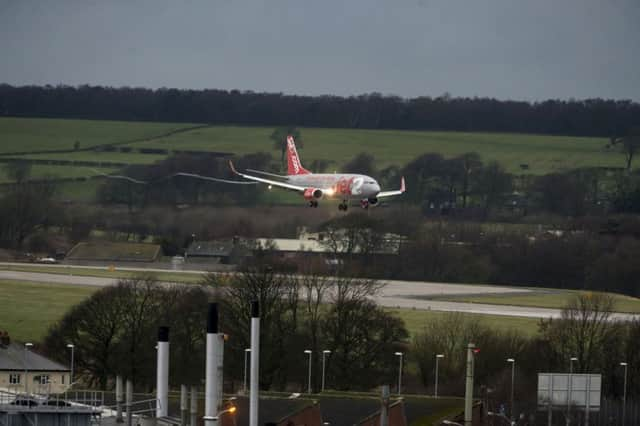YP Letters: Parkway station is the best solution for Leeds Bradford Airport


IN the last few days there has been some debate about the proposed Leeds Bradford Airport parkway station, part of the plans for £270m of transport investment in Leeds. We would like to explain why this is the best and most viable solution to meet a variety of needs and deliver benefits for Leeds and beyond (Tom Richmond, The Yorkshire Post, March 4).
Improving access for passengers to the airport is a priority, and will increase the airport’s contribution to the regional economy. A 2014 government feasibility study into a new rail station at the airport concluded it would cost up to £100m and identified significant engineering challenges. Tram-train has also been considered but would involve significant additional costs, a protracted approval process with no guarantee of success, and challenges to connect into the city’s transport network. Both of these options would take at least 10 years to deliver. That’s too long to wait.
Advertisement
Hide AdAdvertisement
Hide AdOur preferred option of a parkway station scores higher on three points:
1. It can be delivered at a much lower cost, estimated at £23m, making best use of the government money;
2. It can be delivered by the early 2020s – the people of Leeds told us they wanted improvements as quickly as possible;
3. A parkway located on the existing Leeds-Harrogate line would double as a park-and-ride, reducing congestion.
Advertisement
Hide AdAdvertisement
Hide AdWith over 800,000 passengers forecast a year, the parkway has a much stronger business case than a station designed just for the airport, with an estimate of up to 400,000 passengers a year.
We are waiting for a decision from the Department for Transport on the proposals we announced before Christmas. If the proposals are approved we will consult widely on each of the schemes. Following consultation we will finalise the location of the Leeds Bradford Parkway and the link road, in the same way that other major transport infrastructure schemes are developed in the UK. At the same time we will continue to push for significant investment for an integrated mass transit scheme for Leeds and the city region.
From: ME Wright, Harrogate.
A LACK of late-running buses and trains has been identified as “a weakness” in the Leeds transport infrastructure (The Yorkshire Post, March 8).
I can confirm that, well into the 1960s, ‘late night’ buses took over from the normal services around midnight and operated into the small hours, on the major routes, at around twice the normal fare – still eminently affordable.
Advertisement
Hide AdAdvertisement
Hide AdThey were run by an outfit called Leeds City Transport. Imagine – a public service which acted primarily for the public, rather than shareholders. Whatever next?
A rigged meritocracy
From: John Davies, Alma Terrace, East Morton, Keighley.
HURRAH for Jayne Dowle’s article on the weaknesses of selective education (The Yorkshire Post, March 9).
The ‘free’/selective school policy is a political sop to the many Government supporters who ardently believe that grammar schools are the solution to the country’s educational problems, in spite of evidence to the contrary. This belief is founded on four myths:
Merit can be correctly identified;
Merit can be accurately measured;
Merit consists of an individual’s innate potential plus their efforts;
Everyone has the same opportunity to develop the merit.
Advertisement
Hide AdAdvertisement
Hide AdThe disadvantaged are told that if they play in this system they can succeed, but what we have is a rigged meritocracy, a system that is designed to fail them.
The recently deceased Sir Peter Mansfield won the Nobel Prize for Medicine for his part in developing the MRI scanner in spite of being an 11-Plus failure. That seems to point to a huge fault in the educational selection process.
Lots of changes that have occurred from the tripartite system of 1945 to the free schools of today, but schools still regularly “fail”. Could it be that the rotten apple in the barrel is the “independent sector”?
Impressed by hospital meals
From: Ron Goldthorpe, Worsbrough, Barnsley.
I HAVE just read the comments of Prue Leith (The Yorkshire Post, March 9). I do not recognise these from my recent experience.
Advertisement
Hide AdAdvertisement
Hide AdHaving just spent seven nights in Barnsley Hospital, and nine hours at Northern General for tests, I had five star treatment from every member of staff from senior nurses down to the tea ladies at both hospitals.
I was impressed by the quality and choice of the food at both hospitals. Yes, the food was fully cooked, not half cooked as TV chefs appear to prefer.
Surprising tax break-down
From: David Craggs, Shafton Gate, Rotherham.
HMRC has sent me a break-down of where my income tax contribution has gone to for the year 2015-16.
Of the 15 areas covered, the lowest contribution I made was to the EU budget at a mere 1.1 per cent, fractionally less than overseas aid at 1.2 per cent.
Advertisement
Hide AdAdvertisement
Hide AdThis may surprise some people. Another figure that surprised me was my contribution to my own state pension, the figure being 12.8 per cent.
So, having made my NI contributions throughout my 50-year working life towards my state pension, I find that I am still paying for it through my income tax. I suppose, not surprising, the two largest contribution areas were welfare at 25 per cent and health at 20 per cent.